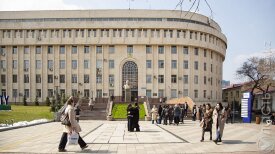First Presser
Kazakhstan’s Prime Minister Olzhas Bektenov held his first press conference on July 15. Bektenov was appointed in February 2024.
Bektenov announced a number of austerity measures linked to a progressive increase of utility tariffs, which the government had postponed last week. The prime minister called these measures necessary, while “painful and unpleasant.” [Read more here.]
He told the press that the government plans to switch gears on production sharing agreement contracts in the oil sector, which have proven unfavorable for the country’s budget, according to the government narrative. Massive projects such as Kashagan and Karachaganak are regulated by PSAs, while Tengiz, the country’s largest oil producer, is being exploited through a joint venture. The foreign companies operating the Kashagan and Karachaganak are currently embroiled in an arbitration claim filed by the government.
Bektenov also announced that state-owned companies will kick-start construction at the coal power plant in the northern city of Kokshetau after a delay in financing and contracting with Russian companies, which had pledged to build Kokshetau’s as well as Semey and Oskemen’s new power stations.
Other Government News
Kazakhstan’s President Kassym-Jomart Tokayev signed the new tax code into law on July 18. The changes, including a new VAT rate of 16% and progressive individual income tax rates, will be effective from 1 January 2026.
On July 16, Tokayev also signed into law a number of legal amendments that introduce criminal liability for forced marriages and stalking. Coercion into marriage, if violent, could result in up to seven years in prison. Stalking could result in fines or up to 50 days in jail.
During a government meeting on July 15, minister of finance Madi Takiyev said that Kazakhstan's public debt had reached 31.9 trillion tenge ($60 billion, or 21.1% of GDP) as of July 1. In the past six months, public debt has increased by 40 billion tenge ($75 million), which were used to finance the budget deficit and to pay off previous loans.
The ministry of science proposed on July 14 amendments to the law on citizenship regarding the knowledge of Kazakh language. Foreigners who wish to obtain Kazakh citizenship must score at least 36 points on the language test, 15 points in the history test and nine points in a test of constitutional knowledge. The plan is to lower the language threshold to 15 points and raise the minimum for constitutional knowledge to 20.
The ministry of education said on July 17 that all educational organizations will have to follow the Adal Azamat program from the next academic year. This new standard fits the presidential goal is to educate honest and hardworking citizens and will be mandatory for private schools for the first time. Justice, hard work, and patriotism will be among the key topics in the curriculum.
The ministry of finance said on July 14 that four border checkpoints had undergone modernization. The checkpoints Kalzhat and Alakol on the border with China, and Kaplanbek and Atameken on the border with Uzbekistan were equipped with high-tech scanners and automated inspection systems. The measure could reduce wait time to 30 minutes, according to the government, which plans to upgrade five more checkpoints on the border with China, Turkmenistan, and Uzbekistan.
Energy, Censorship, and Fresh Air
In the first half of 2025, Kazakhstan’s oil output increased by 11.6% to 49.9 million tons, officials said on July 15, adding that the government does not plan to leave the OPEC+. For years, Kazakhstan has repeatedly exceeded the oil production quota that it had set with the group of oil exporters. “We will do our best to fulfill our obligations, but we’ll take into account national interests,” Bektenov said.
In June, KazTransOil said it transported 160,000 tons of crude oil to Germany through the Russian Transneft pipeline network (Druzhba), down from 230,000 tons in May. On July 11, Kazmunaigas chairman Askhat Khassenov said that the state-owned company had reached an agreement with Hungary’s MOL to supply oil through the southern leg of the Druzhba pipeline, which runs across Belarus and through war-torn Ukraine.
The Prosecutor General's Office confirmed on July 14 that Olesya Keksel, its former top prosecutor, is among the suspects in a torture case that led to the arrest of a number of former officials earlier in July. Keksel led investigative teams on high-profile criminal cases, among which the ones against former Prime Minister Serik Akhmetov and minister of economy Kuandyk Bishimbayev.
Kazakhstan’s ministry of foreign affairs refused to extend the accreditation of nine journalists working for the local branch of Radio Free Europe/Radio Liberty on July 15. Last week, the ministry ruled against the accreditation of seven other RFE/RL journalists. In January last year, RFE/RL filed a lawsuit after 36 of its journalists were denied accreditation and later reached an agreement with the ministry.
Independent journalist Lukpan Akhmedyarov said on July 18 that his Just Journalism account on YouTube was suspended due to copyright violations. Akhmedyarov said that he only used open source, license-free music for his video content, mostly focusing on investigative reportages. Earlier in July, Akhmedyarov said his Meta accounts were blocked.
The NGO Almaty Air Initiative launched on July 17 an online tool to track air pollution in the city. The new dashboard pools data from a number of sensors scattered around the city and provides real-time updates. Air pollution has plagued Almaty for years, especially during the winter season. [Follow this space for our upcoming interview with AAI’s director Zhuldyz Saulebekova.]
Поддержите журналистику, которой доверяют.








